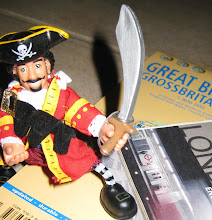
Captain Ruter attended this week's faculty meeting in order to survey the course choices upon him. Everything sounded so interesting, he has decided to attend them all! (Even though the Southwestern student only have the opportunity to register for up to 5 courses, the Captain is quite sure the students will help him learn highlights of and insights from every course available.)
Here, the Captain walks through the list of programmed trips and choices as history teacher Dr. Steve Davidson and CAPA program genius Joanna Shearer discuss whether to put a walking tour of tea and coffee trade, the London Tower Key Ceremony, or an operations management tour of Fuller Brewery at the first of the "shzez-ule." Dr. Davidson will teach 3 courses: World Civilization to 15o0, Global Powers (The Rise and Fall and Rise of Empires -- China, Great Britain, and the U.S....and China again), and Commodities and International Conflicts.
Indeed the Captain knows the great rebellions his crew have mounted when they do not have sufficient coffee! Power and commodities and conflict all weave through Empires....oh, how fortunate for the Captain.
And then there's a Dr. Mary Grace Neville who will build further on commodities and power teaching 3 courses: Business and Society (where the idea for a brewery tour arose!), Foundations of Business for mates intending to major in the field, and Contemporary Issues such as concepts of identity and paradigms and global such and such (he likes the idea of "fostering moral imagination about how business might occur in our 21st century" but admits he hasn't any idea what the blokes there actually talk about in class...).
Everyone will be together for a course called "British Life and Culture" chalked full of interesting walks and tours and talks. A chap called Michael Fosdal, a British lecturer, teaches that course. Southwestern students who the Captain spoke with prior to his journey particularly enjoyed Fosdal.
And finally, the Captain has enrolled in the theatre course (though he'll have to practice spelling it correctly!). He and others will attend class for several hours on Wednesday afternoons to prepare, and then collectively go to Wednesday evening performances of all sorts and all 'round the city. He'll shine up his sword for these events, perhaps even putting a feather in his cap! The programme begins with a group theatre trip to see "Billy Elliott," one that the Captain enjoyed in film form years back.
He's off to begin his reading --- massive assignments for next week's course start. He's eagerly anticipating the Saturday orientation when he'll meet the loads of other SU mates. (And then he's likely to entice several to venture out with him on Sunday or Monday to the Notting Hill Carnival...he's heard it's quite a time!!).




